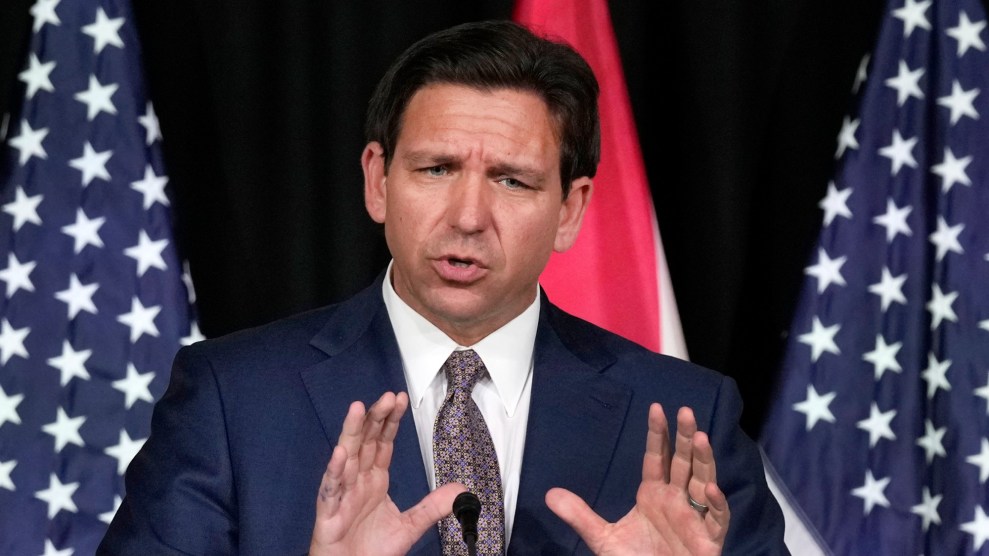
Paul Hennessy/AP
Update, March 8: On Tuesday, Ron Desantis came out against the blogger registration bill, SB 1316. “That’s not anything that I’ve ever supported,” he said. “I don’t support it.” Previously, his office said he would “consider the merits” if the bill passed the legislature.
That sounded like something that might have originated elsewhere. Florida’s blogger registration bill is curiously similar to a section of a Hungarian law that requires media organizations to register with the government. The law, which was passed at the start of Prime Minister Viktor Orbán’s tenure in 2010, initially required news outlets to register before beginning to publish. (After blowback from the European Union and press freedom groups, it was amended in 2011 so that media organizations have to register within 60 days of starting up.) Could it be a basis for the proposed Florida law?
It wouldn’t be the first time Florida looked to Hungary. Orbán’s authoritarian government is in vogue on the American right and its illiberalism has already served as a template for Gov. Ron DeSantis and fellow Florida Republicans. The state’s so-called “Don’t Say Gay Law” was reportedly modeled in part on similar Hungarian legislation. And Rod Dreher, a right-wing figure who lives in Budapest, explained during an interview last year that a reporter told him they had “talked to the press secretary of Governor Ron DeSantis of Florida and she said, ‘Oh yeah, we were watching the Hungarians, so yay Hungary.’”
There are also parallels between Orbán and DeSantis’ efforts to push universities to the right. In 2018, for example, Orbán banned gender studies programs at universities. Last week, Florida Rep. Alex Andrade, a DeSantis ally, introduced a bill that would bar public universities from offering the major. Steve Bannon has called Orbán “one of the great moral leaders in this world.”
Still, Brodeur did not respond to a request for comment on where he had gotten the idea for his potential blogger registration law.
The bill would give bloggers five days to register after their first paid post mentioning an “elected state officer.” They would then have to send in their reports on the 10th day of any month in which they are paid to write about a member of the state legislature or the executive branch. The reports would have to include the date of each blog post, links, and the information about how much the author got paid. Bloggers who fail to file their reports would be fined $25 for each day it is late with a cap of $2,500 per missing report. If fines go unpaid, Florida courts would be authorized to force the recovery of the money. The bill would exempt the “website of a newspaper or other similar publication,” but it makes no effort to define what counts as a similar publication.
FIRE, an organization that has positioned itself as a more conservative-friendly alternative to the ACLU, called the bill an “affront to the First Amendment and our national commitment to freedom of the press.” Brodeur defended it in an interview with Florida Politics by saying, “Paid bloggers are lobbyists who write instead of talk. They both are professional electioneers. If lobbyists have to register and report, why shouldn’t paid bloggers?”
Brodeur has an odd history with journalism himself. During the 2020 election, voters in his district received mailers that encouraged them to support an independent candidate named Jestine Iannotti. The mailers featured the image of a Black woman. What voters might not have known was that Iannotti was a white woman who spent part of the campaign in Sweden. The goal was to siphon votes from Brodeur’s Democratic opponent. Seminole County Republican Party Chair Ben Paris, who worked for Brodeur at the Seminole Chamber of Commerce, was responsible for pushing Iannotti into the race.
In September, a jury found Paris guilty of violating Florida campaign finance law as part of the scheme. Former Seminole County Tax Collector Joel Greenberg has said under oath that Brodeur knew about the plan; Brodeur denies having had any knowledge of it. (Greenberg, who is best known nationally for his ties to Rep. Matt Gaetz (R-Fla.), was sentenced to 11 years in prison last year following a federal sex-trafficking investigation.)
The blogger bill is one of two Brodeur introduced this week targeting the media. The second would make it much easier to sue journalists for defamation—a priority for DeSantis. That bill would create the presumption that information from anonymous sources is false, the Orlando Sentinel reports. It would also limit journalists’ ability to protect the identity of anonymous sources. Hungary’s 2011 media law also tried to make it harder for reporters’ to protect their sources.
The Florida legislation is a slightly less severe version of a House bill introduced by Andrade. The House bill would allow people to successfully sue for defamation even when they are accurately accused of discrimination. Normally, truth is an absolute defense in defamation suits. But under Andrade’s bill it would be illegal to cite a plaintiff’s “scientific beliefs” or religious beliefs in defamation suits related to discrimination based on sexual orientation or gender identity. “If the House bill is a horrendous, horrendous bill, the Senate bill is [just] a horrendous bill,” Bobby Block, executive director of the Florida First Amendment Foundation, told the Sentinel.
The defamation bills mirror a proposal pushed last year by Stephanie Kopelousos, DeSantis’ legislative affairs director. No bill ended up being filed in 2022, but DeSantis didn’t give up. In February, he hosted a roundtable with critics of US media law while sitting in front of a digital banner that read “Truth.” The focus of the discussion was what his office called “Legacy Media Defamation Practices.” By the end of the month, DeSantis had the legislation he wanted. It was all quite Orbán-esque.

DeSantis speaking from the Ministry of Truth.
If passed, the defamation bills would almost certainly be challenged in court. In lower courts, opponents of the law would have a strong case under existing precedents. But as Kopelousos explained in documents obtained by the Sentinel, the long-term goal is to get the conservative Supreme Court to overturn the protections established for journalists in New York Times Co. v. Sullivan, which makes it difficult for public figures to successfully sue for defamation.
Still, we don’t know if the case is one of imitation or two regimes rhyming. And it’s not clear which is worse: Florida Republicans using Hungary’s media law as a source of inspiration or creating a bill reminiscent of it entirely on their own.








